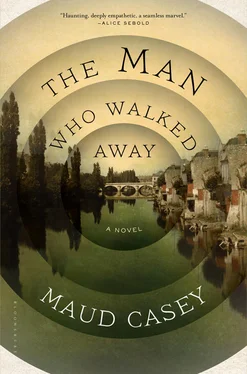Cavelike, the cool darkness inside of the church is like being inside a mind, and that is where the Doctor wants to be, inside Albert’s mind, inside the mysterious realm of his experience. He trails his fingers through the holy water in the cold marble font, then shakes the water from his hand and wipes it on his trousers.
Tsk-tsk.
Thick incense burns on the altar as he reads the tiles covering the walls: Merci à Saint Jacques, merci à Jésus, merci à Dieu . Placing his hand on each cool tile, he wishes fleetingly he were a man of the church and not a man of medicine so that the answer to Albert would simply be God.
“ Tsk-tsk . You are disturbing our prayers,” a familiar voice says, and there is the witchy woman, emerging from the shadows.
“There is no one else in here.”
“Do you think I pray only for myself?” The witchy woman is less witchy in the shadow of the prayer candles’ guttering flames. In the near dark, there is evidence of a more malleable creature, soft and fluid as the wax dripping from the candles. The Doctor thinks he almost detects sweetness. Almost.
“Is this where I put money for a candle?” he asks her.
She nods suspiciously as his coins clink against the other coins already in the box and he retrieves a thin white stick of tallow.
“All right, then,” she says.
He lights the candle with another candle already lit, then waits for the wax to pool, tilting it so the wax falls into the empty metal cup in the candelabra. He fixes his candle there and holds it steady while the blinking eyes of the woman float in the dark, watching him.
“Amen,” she says.
“For a friend,” he says. He has never lit a candle in a church in his life, but the answers often lurk in unlikely places.
“We all need the light of God. No need to run from it. We can all use more light.” She holds out her hand.
He puts a few coins in her palm, but when he turns to go, she follows him down the aisle.
“You can’t hide,” she says. “There is no fleeing. .”
“I have no more change,” he says, putting his hand in his pocket to show how empty it is.
“We can all say no,” she says. “It means nothing. No, no, no.”
When he pushes the door open to go, a river runs over the cobblestones. The rain pummels him as he tries to step outside.
“You will be washed away if you go out there,” she says. There is a question underneath her words: Will you stay?
He takes a seat in a pew near the back and the woman takes a seat a few rows away.
“There is no escape,” she says. “Why do you flee?”
“I’m not fleeing,” he says. “I’m right here.” He lays an arm across the cool wood of the pew, resting his head for a moment there, and closes his eyes. Behind his eyelids, the word remains: flee . One usually flees from something, but might one also, contemporaneously, flee toward something? Astonishment? Flee , the word, echoes in the cave of his own mind: flight from and toward. Fugue means flight. Originally from the Latin fuga , an odd combination of fugere, to flee, and fugare , to chase. Or maybe not so odd. Fugueur .
And? So? Albert might be the first of his kind, similar to a musical fugue, a contrapuntal counterpoint, a style rather than a fixed structure. Together, the sounds Albert’s story makes create a new sound. Different than the recent case of the great doctor’s, in a journal the Director showed him just yesterday. The case involved a deliveryman, a collector of bills for clients to whom he delivered bronze artworks and chandeliers. The Doctor could imagine the deliveryman, blinking and blinking as the hairy bear led him into the amphitheater, coaxed by the great doctor into telling his story, which began with a headache as he took the Rue Amelot to Avenue de Villiers, where he stopped in front of number 178 Avenue de Villiers, the address to which he was meant to make a delivery. But he did not go in. When he woke up, fourteen hours later, he had no memory of where he’d been or how he’d gotten there. He said, I discovered myself in the Place de la Concorde. I was famished . Though it appears the delicate, blinking man wandered only once and never again, the great doctor chalked it up to a male form of the Great Neurosis probably caused by some kind of physical trauma, favoring a neurological explanation. “There may be something to this,” the great doctor is quoted as saying. The Doctor heard a claim being staked in the this that was the question of Albert. “This is not so rare,” the great doctor went on to say in the article. It was clear to the Doctor then — the great doctor would take Albert’s questions, as he had taken everything else, for his own. Why do you walk? Why can’t you stop ? But there is more yet to find out about this man who escapes and escapes and escapes without success from a world he cannot seem to bear. The Doctor would draw his own conclusions about his patient, and besides, Albert does not belong to the Doctor. What he is after is a new diagnosis, and diagnoses are stories, and this would be Albert’s.
“It is still raining,” the woman says. Stay a little while longer in the dark with me .
She is lonely, and though he is eager to return to Albert, he is no stranger to the desire for company and he stays a little while longer in the dark with this woman who has helped him, though she will never know why.
The answers often lurk in unlikely places.
“I’ll stay a little while longer,” he says. “Thank you.”
When the rain lets up, the Doctor crosses the slick street, rolling his bicycle carefully through the asylum arch. There is Marian, perched on her bench, and Walter next to her, leaning in to whisper conspiratorially, something the Doctor can’t quite hear about a soul murder . “I can’t pay attention to you,” Marian says, grabbing Walter’s hand as though they were on one more sinking ship. Rachel huddles around the Director, examining something. “These worms help the soil. They are not disgusting,” he says, putting a worm in Rachel’s outstretched palm as she winces but not without fascination. Claude and Henri keep an eye on the veteran as he digs and digs, while Samuel trembles in his giant coat, looking on. “I’m not thinking about him,” the veteran is saying, “I’m not thinking about that deserter, his running away, running away. Fuck those chirping birds. .”
“And all is right with the world,” Nurse Anne says from the doorway as the Doctor approaches.
“Amen,” he says.
“The veteran is making trouble,” Nurse Anne whispers so that anyone paying attention — the Director is not — might hear, “He should be separated. The Director is too kind.”
But the Doctor isn’t paying attention either. He is anticipating Albert’s glistening, eager eyes. Here you are at last , they say. Yes , the Doctor thinks, here I am at last.
In the common room, Elizabeth is bent over her puzzle. “It is the funicular that requires my attention,” she says to no one in particular.
“Those people won’t wait for that funicular forever,” the Doctor says, trying for lightness. He only means to joke with her the way he sometimes does, but he hears the prickle in his voice at that eternally unfinished puzzle and Elizabeth’s insistence that it will be finished tomorrow. There is time , his father said. But impatience with waiting for tomorrow is causing him to itch. “They’ll grow tired and they’ll walk up the hill,” he says.
As Elizabeth tucks a strand of hair behind her ear to reveal her pointed chin, he already regrets his words. Her thin, thin face and the dark circles under her quick eyes that never fade no matter how much she sleeps; that puzzle that is her whole world for days on end. How could he be so callous?
Читать дальше












